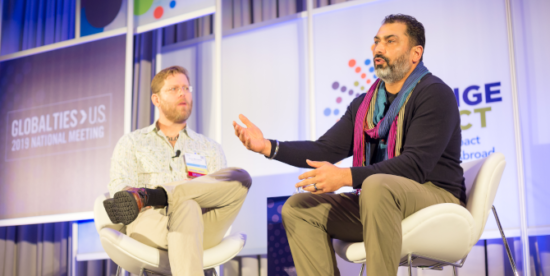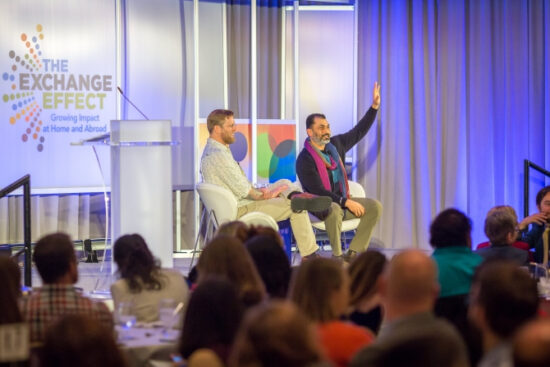
Serve2Unite’s founders Arno Michaelis (left) and Pardeep Singh Kaleka at the 2019 National Meeting. All photo credit: A.E. Landes Photography
Each year at the National Meeting, Global Ties U.S. presents the Citizen Diplomat Award to an individual or organization for their exceptional work in empowering, engaging, and connecting communities. This year, the award was presented to Serve2Unite, a Milwaukee, WI-based organization that works to address violent extremism, gun violence, and other issues through people-to-people dialogue. Here, Serve2Unite’s co-founders Arno Michaelis and Pardeep Singh Kaleka share more insights on their work and what the award means to them.
The Global Ties U.S. Citizen Diplomat Award recognizes outstanding individuals and institutions for their achievements in furthering international understanding. What was your reaction to learning that you won our 2019 award?
We were incredibly honored. As global engagement is a core pillar of Serve2Unite it was all the more special to be recognized. It’s great to have years of hard work by our brilliant global mentors, students, and educators acknowledged by an organization as esteemed as Global Ties U.S.!
Empathy and the ability to empathize form the core of your work. Why do you believe empathy is so important, and what are some tips to help us improve our own empathetic abilities, especially when it comes to listening to those from whom we may not want to hear?
Empathy is essentially a connection. Separation is the common root of all social problems—empathy is a powerful cure. A good way to connect with someone we may disagree with is to ask questions about their personal experience. The storytelling involved in the answer is an amazing way to connect and cultivate empathy.
For conflicts or social divides that seem truly intractable, how do you encourage people to take that first step towards changing the dynamic?
Creating a space for uncertainty is crucial. Along with separation, certainty is also a common thread of human conflict. Ask a question that can be authentically answered: “I don’t know,” then pursue that thought. Possibility stems from uncertainty.

A lot of your work focuses on empowering and engaging youth to be active citizens, but what about the older members of society? How can we help strengthen intergenerational understanding and create an engaged, inclusive citizenry?
Service projects are a brilliant way to connect people across intergenerational lines, as older people can contribute wisdom to most effectively guide the energy of youth.
The Global Ties Network is comprised of more than 40,000 community leaders and volunteers dedicated to bridging cultures through people-to-people interactions and sharing American culture and values with the world. What advice do you have for us?
Never underestimate how important the social fabric you weave is to the health and future of human society. A robust social fabric—meaning, communities where people feel valued and included—is an environment ripe for resilience and healing. When we don’t put energy into the social fabric, the effects of neglect are conducive to violence and suffering.
What’s something that you’ve learned in working with youth/community members that’s most surprised you?
Young people have demonstrated time and again what relentless optimism really looks like, and they do so naturally. While we adults really have to work at being optimistic sometimes, being around young people reminds us how it can and should be a natural state.
In your opinion, what makes citizen diplomacy so important, and how can next-generation leaders make an impact in their communities or countries?
Citizen diplomacy creates a very important buy-in to community and society. When people feel their words and deeds make a positive difference, as is the intention of diplomacy, they are motivated to serve and respect their fellow citizens. Young leaders can best guide their work in a positive direction through servant leadership that is solution-oriented, rather than problem-defined. Be about what you are for, rather than what you’re against.
Check out Serve2Unite’s full speech and panel at the 2019 National Meeting on YouTube.
